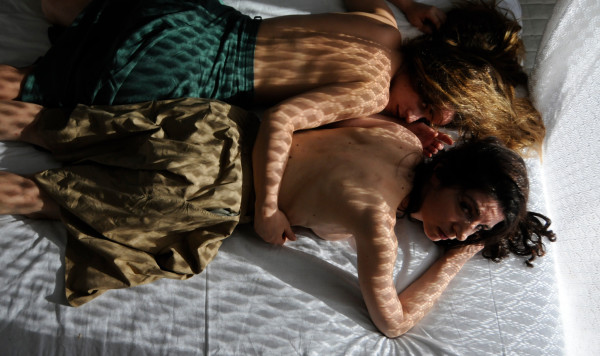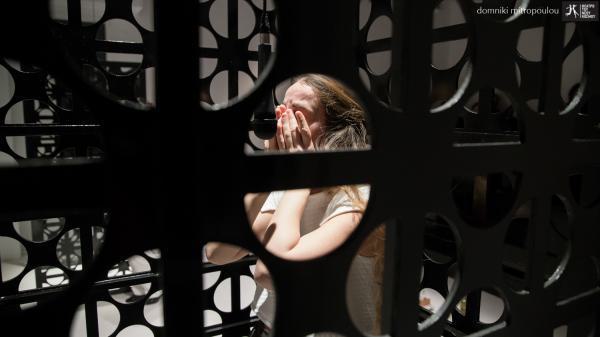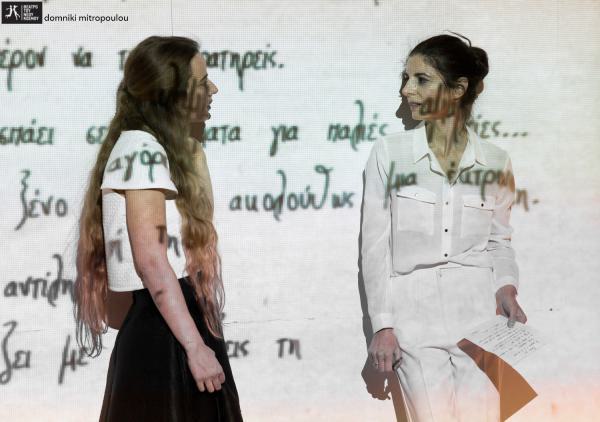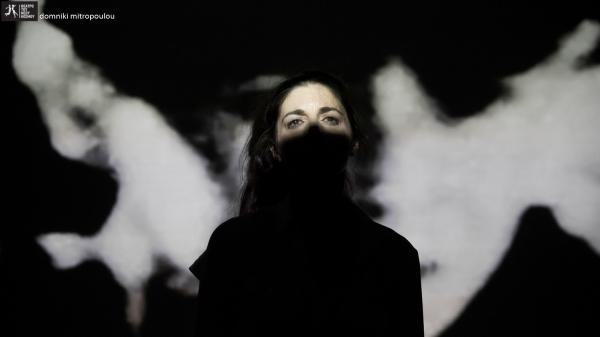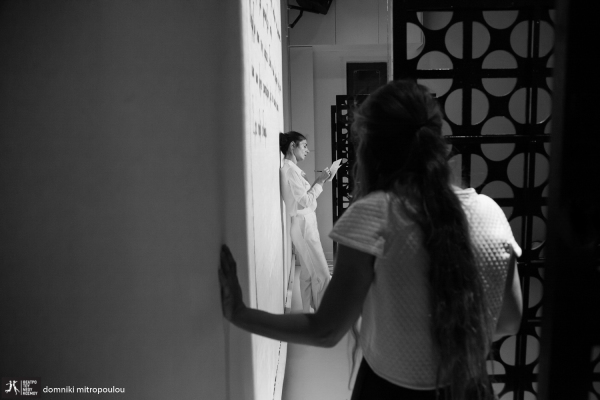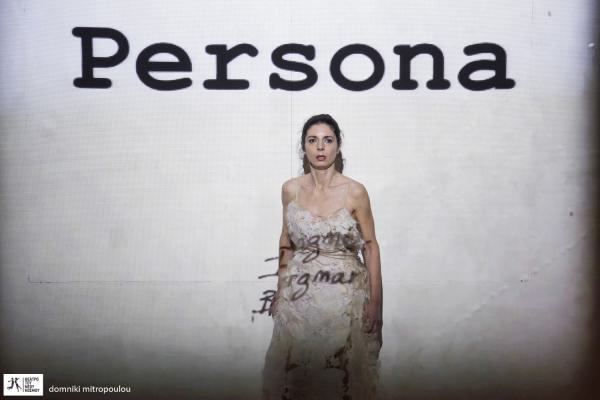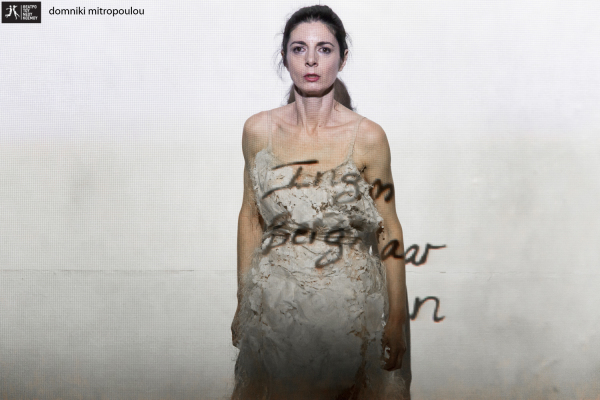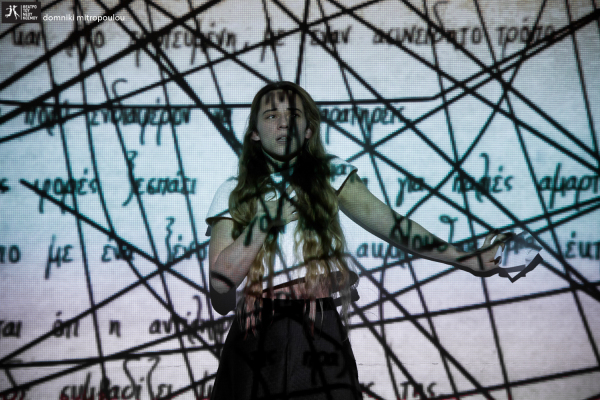How is a whole personality? As it really is, is it bearable?
A futuristic video clip introduces the most linear filmmaking, a classic painting into an ultramodern frame, a smooth story with plentiful but totally equivalent interpretations, an endless monologue with two faces, or many more or maybe not even this…
The actress Elizabeth Vogkler, during a performance suddenly stops talking and stands still in front of the spectators. Since then, she stands still and silent in front of everybody. From the stage of the theater she is transferred in a white, cold hospital room and from there to the ominous snugness of a private residence. The treatment of the actress is in the words of the loving nurse, Alma, in the words of the not-so-loving, in the words of the not-so-nurse, in the not -so-exclusively her own words. The treatment will be left in the Speech, and the Speech will take over both women. The initial transparent and precisely defined roles will be blended, will change, will be undermined, will marginally balance, will turn to continual unreliable hideouts, will be an inch from outburst, even more they will be in danger of becoming only one role.
A story about the internal struggle of every person, for the most dangerous other self, the one who chooses when he/she will come to the surface, for these two which actually is one, for the other version (of us), for the hidden half of our personality; for a confrontation about domination without rival. How is a whole personality? As it really is, is it bearable?
The Elephas Tiliensis team collides with the aesthetic and the reflection of an artwork, which was crucial for the outlook that was passed on us the previous century. The team experiments with a “text” of clinical accuracy and abstraction which is encapsulated to the most demanding acting, in a play for only one role, which is actually two.
Persona is the mask of the actors while they are playing a role.” Dejection and sorrow and tears which change to powerful outbursts of joy. Sensitivity in the hands. The broad forehead, severity, eyes survey the unreadable childishness. Gradually I find the word I’m looking for. A persona hardly perceptible into whiteness. The persona of Alma. The persona of Vogkler “.
The enigmatic masterpiece of Ingmar Bergman is adapted to a theatrical play from the group Elephas Tiliensis.
Dramaturgy editor:
Music:
Set designing – Costumes:
Lighting:
Choreography
Slideshow
Electra’s costume
Costume designer assistant
Actors
The Αctor’s voice
The Doctor’s voice
Alekos Lountzis, Anastasia Mitropanou
Savina Yannatou
Magdalene Avgerinou
Nikos Vlassopoulos
Eddie Lame
Mikaela Liakata
Ioanna Plessa
Constaninos Chaldaios
Despina Kourti, Vicky Katsika
Maria Kechagioglou
Argyris Xafis
The directors’ notes
In “Persona” of Ingmar Bergman, on which we have chosen to work, one follows the story of two women, wearing straw hats and compare their palms, as the great Swedish director writes in “Magic Lamp”. They compare the lines of their life, their fortune and their fate. And this, according to a Swedish proverb, is bad luck.
This magical and dreamlike theater, which has to do with the most instinctive sides of our soul, is the focal point in our work. This theatrical treaty provides the necessary secure framework – whose terms and rituals is a common experience, either we take part as spectators or as creators – in order to believe in the delusion that the theater itself is, in other words, to find the lie in the truth and the truth in the lie. In “Persona” we observe two people who will take the risk to confess, to enjoy themselves, to play, to set themselves free, to get connected and empathize with each other, while we observe them, we observe ourselves too. Bergman’s text is an existential thriller, a comedy about the artist’s situation who anxiously seeks for the truth, although he is perfectly aware of the delusion he creates.
The meeting of the actress, Elizabeth Vogkler, and the nurse, Alma, has caused many interpretations and all of them are quite probable. But the magical merit for us is that it “does not matter”. It doesn’t matter if we don’t choose, because all these interpretations or none of them can actually be true. Because, here the persons do not communicate on the basis of content, but on the basis of meaning and meaning becomes completed by the individual need of each of us, by our deficit and our surplus. But actually by the deficit. And it is true that we are full of deficit.
Bergman, the absolute anatomist of the soul, with the most delicate scalpel and the sweetest narcosis, redirect us into our own self. And this is the simplest, folk art of the theater: to see something a little bit from yourself on stage, whatever this can cause to you.
Dimitris Agartzidis, Despina Anastasoglou
Photos: Despina Anastasoglou
Performance photos: Dominiki Mitropoulou
Trailer: Mikaela Liakata
Press
Εφημερίδα των συντακτών|Έφη Μαρίνου
athensvoice | Γιώργος Δημητρακόπουλος
debop.gr |Έφη Χρυσού
artplay.gr | Μάνια Ζούση
Νεα | Μαριλενα Θεοδωράκου
newsbeast | Χαρά Κιούση
life.gr | Γεωργία Οικονόμου
artic.gr | Μαρία Δουκάκη
Dudukatheater | Διονύσης Αναλυτής
Debop.gr | Ηλίας Μπιστολάς
Έθνος | Αντιγόνη Καράλη
Λίνα Ρόκκου | popaganda
toperiodiko.gr | Χρήστος Σκυλλάκος
cue | Ήβη Βασιλείου
culture now
gkoutouroblog | Maνώλης Βαμβούνης
tospirto.net | Χριστίνα Φαραζή
the toc | Αργυρώ Μποζώνη
in.gr | Ελισάβετ Σταμοπούλου
tospirto.net | Χριστίνα Φαραζή
Δρόμος της Αριστεράς | Χριστίνα-Βαλεντίνα Θάνου
Ημερησία | Γιώργος ΒαΪλάκης
tospirto.net | Χριστίνα Φαραζή
Performance photos








